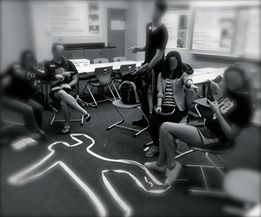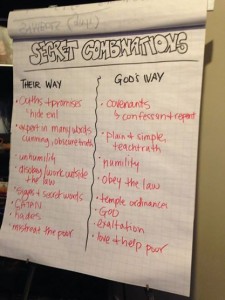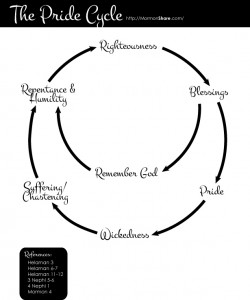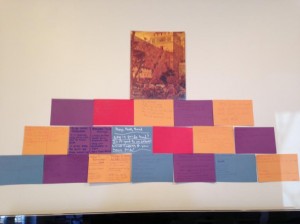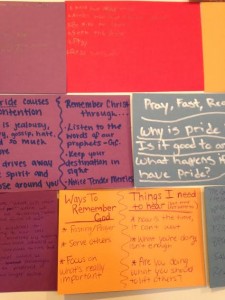Helaman 1-5
Had to combine this day due to snow.
We continued with March Madness. Kids shared “what did you learn”s with the class from the reading. On the board I wrote the following words:
trolling, bullying, picking, teasing, joshing, joking, criticizing, gossiping, ridiculing, make fun of, judging
I opened with a short discussion about what God sounds like (Helaman 5:28–31) and what that teaches us about God. One point I made was that in this passage God speaks to those who need to repent in a kind tone of voice. He could be shouting “repent”, but he isn’t. He speaks in a way that pierces souls.
After that we read Helaman 3:25, 25. Things are going well, but then pride begins rearing its ugly head in Helaman 3:33, 34, this time manifesting itself as cruelty to others. After gesturing to the words and reading them aloud, we talked very briefly about how pride can be both because we think we are above someone looking down on them, or because we think we are below someone looking up (see Beware of Pride by Ezra Taft Benson).
I told the kids that a new video had come out on bullying, and it was going viral — at least as viral as a church video can go — and that I wanted them to see it. But first, I shared with them the backstory found at Mormon Momma. I just told the backstory, but I did have the blog page up on the screen in case someone wanted to read it. The blog entry isn’t particularly faith-promoting, but a summary of the stories about Mormon Momma and her daughter’s experiences with bullying helped set the stage for the video. I used this to remind the class that bullying happens at church, too, and that we must stop it. Knowing the backstory, and since one of my students knew the kid playing the bully, so that personalized it, too:
This video is particularly moving, and our discussion afterward was pretty great. I can identify with the bullies and the bullied, and it’s a good reminder for us to stop it and treat others kindly. Someone shared it in the Facebook group, and it was perfect.
I had planned to tie this in with the scripture mastery Helaman 5:12, but didn’t have time. Had to do 5:12 on our flex day the following day.
Helaman 5, Flex Day
It’s still March Madness, so we focused on earning some points. I had just two activities today. One was a game we called Mad Ball. Here are the instructions, and the questions I used are below:
- Spell Rameumptom
- Name a prophet mentioned in the Book of Mormon whose name starts with ‘z’. (Zenock, Zenos)
- At the time of Nephi, brother of Lehi, who was more righteous, the Nephites or Lamanites? (Lamanites)
- Complete the statement: Adam fell that _____. (“men might be, and men are that they might have joy”)
- Name the scripture mastery reference that says “I will go and do” (1 Nephi 3:7)
- Name the scripture mastery reference that says “when ye shall receive these things”. (Moroni 10:4–5)
- There are only three women mentioned by name in the Book of Mormon. Name them. (Abish, Isabel, Sariah)
- Complete this statement that relates to a scripture mastery passage: when the whirlwinds of life’s temptations and trials come, we need not fear because of the _____ of our Redeemer, which is a sure foundation. (rock, Helaman 5:12)
- Name the three sons of Alma the Younger, (Helaman, Shiblon, Corianton)
- Nephi and Lehi, sons of Helaman, stood in fire and looked which direction? (upward/heavenward)
- Alma 41:10 reads “wickedness never was _____.” (happiness)
- The land of Desolation was called Desolation because of what? (the dead people from the Jaredite wars)
Usually I go with less trivia-type questions, but today I decided to keep it light because of the snow and daylight savings time.
Mad Ball combined with missionary moments took up about half of class time, so we used the remainder of the time to memorize Helaman 5:12. I made a handout to help with memorization and gave each team 25 points per person who memorized it word-perfect. The following day I gave individuals who knew it 10 points. Those who passed it off the previous day could repeat it again and get 10 more points.
Helaman 6-9
I had to cover 6-9 all at once because of snow.
Before class, I taped the outline of a dead body on the floor and decorated the room with crime scene tape. In retrospect, this wasn’t really necessary since I didn’t do a big production for the murder in this lesson. This would have been more exciting if my kids hadn’t all read the text and all knew the end story. For classes who don’t read, this would be more fun. Here’s an example of what the body looked like, though this isn’t my class (I forgot to take a picture):
I taught the kids that the Gadianton Robbers were a counterfeit organization for Christ’s Church. We listed on the easel some ways that was so from the reading. I started this list on the easel because I knew we’d add to it later. Here’s what it looked like later:
I then showed the video from the Book of Mormon DVD for this section. (The online version is better quality and is broken up into segments, but my internet wasn’t doing right.) I used a handout for students to work in pairs and fill out the CSI Zarahemla form on the Facebook group, but I should have taken into account that all these kids know this already. It was a bit of a flop. The kids liked the movie, though.
Here is more information on the CSI Zarahemla/Murder Mystery stuff if you are interested:
- https://www.facebook.com/groups/LDSSeminaryTeacher/permalink/1471028656448866/
- https://www.facebook.com/groups/LDSSeminaryTeacher/permalink/1468217063396692/
- https://www.facebook.com/groups/LDSSeminaryTeacher/1473720732846325/
- https://www.facebook.com/groups/LDSSeminaryTeacher/1466107833607615/
Helaman 10
My lesson objectives were
- Students will recognize the characteristics in Nephi that made him a trusted servant of God.
- The sealing power — what is it, who has it, and how temple sealings work
- Students will understand the role pondering has in receiving revelation.
I was nervous about this lesson. I have students whose parents are divorcing and others who are divorce, and I knew a discussion on sealing could go horribly wrong. I worked to put the focus on sealing of families since I had a student who had recently been sealed to her adoptive brother and sister. It went fine.
I set the stage by teaching that Nephi has just prophesied the murder of chief judge, and the people just wander off when it’s all over. What does this say about the people? What does Nephi do? What role does pondering have in receiving revelation? Where are some times that pondering is particularly effective or appropriate?
Some of you are learning to drive. What characteristics do you want in those who are on the road around you? (I listed these on the board. Some were not distracted, not raging, experienced, trained, obeys the law, drives the speed limit, etc) How do you want someone to behave when they enter a school zone — do you want them to slow down before or as they arrive at the school zone, or after? Why? Well, Nephi was like that. Read Helaman 10:12. He immediately obeyed when instructed by the Lord. He didn’t wait or go home. He turned around and god to work. How would you feel with Nephi on the road? Why?
As a result of Nephi’s obedience, the Lord gave him many blessing, in vv 5-7. We are going to focus on the sealing powers. Matthew 16:19 defines sealing. Where does sealing authority come from? What do we seal? Where?
Then I had the student, who I had warned ahead of time, to share her experience briefly. We ran out of time and so this didn’t have a chance to get out of hand. Went fine.
Helaman 11-12
This was an easy lesson, and particularly effective, I think. On the board I wrote down the following questions. I find when I have questions that I really want students to ponder, writing them on the board prepares the class for a good discussion.
- What have you learned from your reading and experience about pride?
- The Nephites seem to follow a repeating pattern relating to pride. Can you identify it in today’s reading?
- Why do you think pride seems to increase when people prosper?
- What role does chastening play in God’s plan to exalt his children (Helaman 12:3)?
In this verse, we find a way that we can break free of this cycle of chastening and suffering and avoid becoming prideful. It’s remembering God. I passed out this handout:
Yeah, I made it. I’m pretty proud of it :)
I explained to students that I wanted them to come up with ways to Remember God and remain humble. I told them they’d write down and share some of those ideas and then as they heard their friends share good ideas, to improve their list by adding to those ideas. I gave students a few moments to list ways that they remember God silently. Then we went around the classroom and shared. I had 20 students present, but I was surprised at the variety and depth of responses. This was a great discussion.
We started the Beware of Pride video, but didn’t have time to finish because our discussion went so well. I decided to save the place it stopped for the next day and watch it then.
Helaman 13
Before class, I wrote this quote on the board: “How we respond to the words of a living prophet when he tells us what we need to know, but would rather not hear, is a test of our faithfulness” by Ezra Taft Benson.
For our lesson opener, I had students write what a tweet in their notebooks with what they felt was the most important quote in this chapter. Shared a few.
I gestured to the quote on the board and explained that with General Conference coming up, we’d have a chance to hear some things that we needed to know, but might rather not hear. I had students write “What I need to hear” under the tweet. I explained I was going to show the rest of the Beware of Pride video, and I wanted them to write down some things they needed to hear in this talk. Went awesomely. I could tell they were affected, even the latecomers.
I had students choose the three most important things they learned from the talk and mark them. Then I handed out some block-shaped pieces of paper. On each, I had students write three things from this talk that were important, and three things from the “Remember God” ideas we wrote on our Pride Cycle handout that were important. I explained that I would put the blocks up on the wall to put a picture of Samuel the Lamanite on to be used later:
Helaman 14
For this day I made a handout. I did two sides, one easy and one “Honors Seminary” side. Students could choose whichever side they wanted to start on. I let the kids work until the first student or two finished, and stopped them, explaining that they could fill in the blanks with others answers. Worked out great. I did find that not everyone knows the definition of the word discrepancy. And, as it turns out, the music from Frozen is extraordinarily annoying if you haven’t seen the movie (which I haven’t).
Helaman 15-16
This was a GREAT lesson! I didn’t find any activities of particular value in the manual for this lesson, and the points I wanted to raise weren’t really addressed. It took me a little bit of pondering to determine what I wanted to do, but when I finally figured it out, it was so simple it worked out just right!
After missionary moments (we had 5-6 good ones shared, which was probably a record) I gave a very brief explanation of the history of the chapter to remind the kids what they read. Basically, Samuel is preaching, some believe and are baptized by Nephi, but others don’t believe and throw stones and shoot arrows at him. I decided he must do parkour since he “cast himself down” from the wall safely. Anyway, after that, I wrote the following scrambled words on the board:
- FIRM – IMRF
- HARD – RHDA
After the kids unscrambled them, I asked who in what they read was “firm” (Lamanites) and who was “hard” (Nephites). What is the difference between being firm or hard? This was a great discussion.
Next I had the kids read the following verses and we contrasted the two groups:
- FIRM Lamanites: Helaman 15:6–10
- HARD Nephites: Helaman 16:12–15
The kids were able to easily discuss what the different attitudes of the two groups were and the difference between being hard of heart and firm in the faith. Firm people can still be shaped. They acknowledge others, like parents or prophets or leaders, who can guide them, but they can not be persuaded to do wrong. Hard people will not listen to others, and refuse to see or acknowledge signs. They reject the words of prophets and depend on their own strength and wisdom. The Lamanites were firm in their determination to share the gospel, they entered covenants and kept them, their hearts were changed, and they repented, One kid shared a cross-reference that related from EFY. I love it when they connect what they are learning with something they already have learned.
Even though both groups heard the same message, one became firmer while the other became harder. Has this ever happened to you? Have you heard advice at General Conference or read something in FtSoY that when you first heard it you were hard and later you became firm? My students ran with this. One girl shared her experience while doing personal progress. She had been listening to some music that she liked but that her mother felt was inappropriate. For PP, she went without that music for two weeks and only listened to things that brought her closer to God or that were uplifting. At the end of the two weeks she could see a marked difference. It was difficult for her to humble herself from feeling hard about her music, but now she is firm about upholding her standards in music choices. Next the students brought up movies. We came to decide that we can’t rely on others, like Hollywood, to tell us what’s appropriate to watch. We can do a little research at some of those family-oriented movie reviewing sites and determine if a show is going to suit our standards or not. Anyway, it was a pretty great discussion. The younger kids learned a lot from the experiences of the older kids who have learned some things about movies and media in general.
The discussion was so great that I didn’t even get to do my fun bows and arrows activity, but we’ll do it at the beginning of class tomorrow. Even my son thought it went well! Win.

